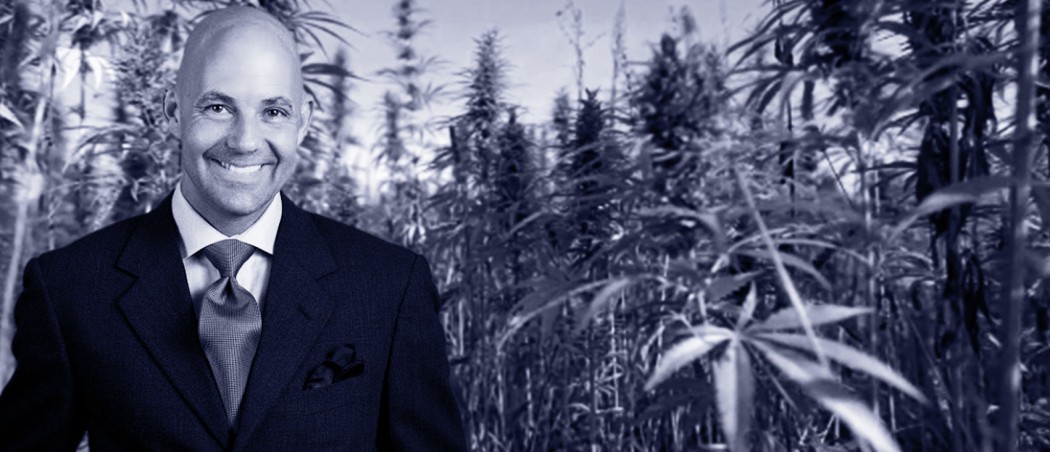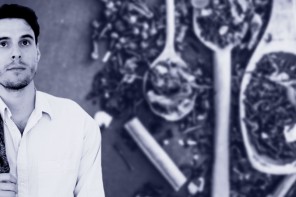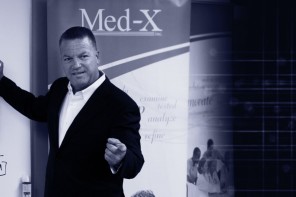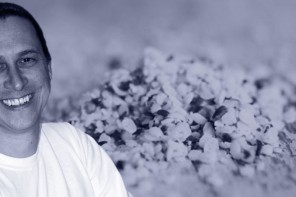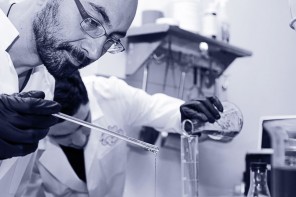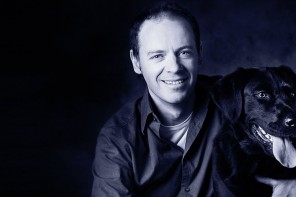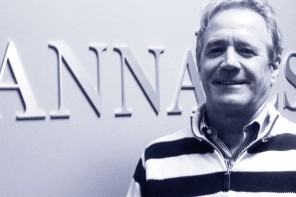Stuart Tomc: CannaVest (OTC:CANV)
He’s spent the majority of his career in the Natural Products Industry and has been a witness to the waves of trends, consumer-awareness, and the changing tide of how to beat the aging process. It was a moment of clarity that brought him to discover CBD and recognize its incredible healing medicinal benefits. Stuart Tomc, Vice President of Human Nutrition at CannaVest (OTC:CANV), is now one of the crusaders who is bringing education, awareness, and factual integrity to our culture and exposing the benefits of cannabidiol.
What was the deciding factor for you to join this particular industry?
The very first time I consumed agricultural hemp-derived CBD cannabidiol, I knew it was time for me to join the cannabis revolution!
What were you doing before?
I was the Global Educator for a company called Nordic Naturals and for nearly 10 years, I traveled the globe educating doctors, pharmacists, clinicians, and food store employees about the benefits of Omega-3 fatty acids. Prior to that, I worked for a company called North American Herb and Spice, which was a pioneer company in the field of spice extracts. Sometimes refer to myself as the “Oil man” because I initially worked with Oregano oil, then Fish oil, and now Hemp oil!
Tell me about the point in the time you realized the coming of the ‘green rush’?
Well, as a former cannabis consumer, and having known of the potential medical applications and benefits of CBD and THC, I knew the ‘green rush’ was coming about 20 years ago. Having a background in natural medicine and working in the natural products field, I knew that one day, both of these worlds would collide. As public perception and public policy changes, cannabis and cannabis extracts will come out of the shadows and out of the clandestine operators into the more early-adopter and eventually mainstream markets.
It was about 10 years ago when I first saw the medical literature surfacing, but it’s really been the last couple of years that we started seeing the reports on Charlotte’s Web and medical literature suggesting the role of CBD, THC, and some of the other phytocannabinoids as immune modulators, neuroprotectants, and the role they could play in potentially modulating redox to protect cells when need be and to eliminate cells that need to be eliminated.
It was sort of a confluence, watching the social tide change, watching younger people that work in health food stores, the millennials, understand that cannabis had tremendous healing powers that they weren’t afraid of. So, although I can’t really pinpoint an exact moment, I know it started about 20 years ago with my personal interest, 10 years ago with the medical literature, and 2 years ago when I started seeing younger employees in health food stores becoming very progressive thinkers and open to the healing benefits of cannabis.
It was sort of a confluence, watching the social tide change, watching younger people that work in health food stores, the millennials, understand that cannabis had tremendous healing powers that they weren’t afraid of.
Right now, where are you guiding your passion and energy towards?
I’m guiding my passion and energy towards educating people about the tremendous healing, medicinal, and nutritional implications of cannabis, agricultural hemp, and CBD in particular. The main focus of my energy right now is to help people understand the very complex and nuanced potential mechanisms of action of how these remarkable compounds may work in the human body.
One of our main foci and one of my personal foci is to help people prevent people from saying stupid shit. Every time I read an article about cannabis that’s online or about hemp extracts, they are riddled with oversimplifications and generalizations. So, I’m putting all of my energy and all of my focus on the rigor to articulate the science and, more importantly, not to overstate the science. My observation has been that there are really two groups that are involved in the discourse around cannabis, around CBD, and around THC. One group suffers from extreme bias– they happen to believe that cannabis is the greatest cure for every ailment known to man. The other group of people believe that there’s no medical benefit at all and this is still the demonic devil weed. I believe that somewhere in between lies the truth.
I always look for paradoxes and that’s where I try to ask the next intelligent question. I like to live my life the way a summary is at the end of a well-written scientific paper that suggesting that further research is necessary and points clear direction as to where we should point our attention.
Describe your work ethic to me in one word.
Tenacious.
Tell me about a time in your career that didn’t go as planned and what you did about that? How did you handle it?
Well, I remember that very very very clearly! Without mentioning where I was working, I was involved in the messaging and education for an ‘Enterprise’ and I became acutely aware that the more technologically savvy were less interested in slogans, advantages, benefits, and marketing sales pitches. I watched a paradigm shift that happened with the emergence of Adbusters that culminated a lot of the social protests against the over-commercialization and consumerism that has left us as a society dissatisfied and unhappy. As the main conduit to our customers, and our customers being young and tech-savvy, I went back to my superiors and told them that things have changed. The smarter, younger people don’t want to hear, ‘Hey! We have the #1-selling pizza!’ They are much more interested in evidence, in science, and in facts. At the time, we were being told that our average consumer had a very low level of intellect, weren’t smart, and didn’t read, so we had to ‘dumb’ everything down. In my interactions with younger people, I saw this to not only be untrue and an oversimplification, but it was 100% wrong.
The smarter, younger people don’t want to hear, ‘Hey! We have the #1-selling pizza!’ They are much more interested in evidence, in science, and in facts.
So, I was faced with a situation in which I was right and the people I was working for were wrong. So, what I did was make a decision to take this knowledge I had gained and instead of trying to go to battle with anybody or trying to prove anybody wrong myself, I just decided to be open to an opportunity where I could share factually accurate and relevant information that was free of commercialization and brand hype. What I did was to allow this opportunity to help me challenge myself and reflect on the times in my life when I was inflexible and unwilling to change and accept the fact that when starting a social movement, when starting a revolution, people are always going to be scared and feel threatened by the new technology like those back in the day who’d say, ‘That damn, evil, printing press. What good would that have for our society?’
I used this challenge to reflect and temper myself from hot to cold, and sharpen the sword, so to speak. I remember it as a personal challenge to grow myself and I learned that my personal responsibility was to seek to understand, rather than to be understood and if my mission is to ease the suffering of others, then that has to start on a personal level. By consuming the hemp-derived CBD, I was able to ease the suffering inside of myself and spark my passion to start the agricultural hemp revolution or at least participate in it! The confluence of those things happened at the most appropriate time for my own personal development.
I remember it as a personal challenge to grow myself and I learned that my personal responsibility was to seek to understand, rather than to be understood and if my mission is to ease the suffering of others, that has to start on a personal level.
What book have you read that you’ve been inspired by? Any particular read we should put on our list?
Yes, the book that has changed me the most is called Obliquity by John Kay, which is about how our goals are best achieved indirectly. The other book that really inspired me was Cultural Jam by Kalle Lasn. And although I read Cultural Jam before Obliquity, it was Obliquity that made me understand that what consumers today, whether they’re consumers in the cannabis space or not, desperately seek and want more than anything is factually accurate reference-able data. I made the observation that people love to buy and they hate to be sold and the days of ‘Plop! Plop! Fizz! Fizz!’ Oh What a Relief It Is! are dead, thank goodness.
I’m more interested in a more direct conversation. I believe it works better than some broad conventional national marketing campaign that relies on part of pop stars, pro-athletes, or other large names.
And, for good measure, a third book that just hit me that everyone should read is The Biology of Belief by Bruce Lipton. I had spent 25 years trying to beat the clock. I was interested in the idea of anti-aging until I realized that the only thing that was anti-aging was death. I had spent years in the natural product industry trying to control, fix, and damage all of these external variables that people were married to – “If I just eat this one thing. If I just take this one pill. If only I was paleo. If only I was vegan. If only I took more probiotics.” And I watched people around me, try every different formula and they invariably hit the same brick wall. When I read The Biology of Belief, Bruce helped me understand that 95% of our health outcomes are directly or indirectly influenced by our subconscious. Only 5% of our health outcomes is influenced by our exoteric behavior meaning that if you don’t unblock the negative, self-defeating feedback loops in your subconscious and find unconditional love, you can drink all the Kombucha you want, but you’re still going to be rotten.
When I read The Biology of Belief, Bruce helped me understand that 95% of our health outcomes are directly or indirectly influenced by our subconscious. Only 5% of our health outcomes is influenced by our exoteric behavior meaning that if you don’t unblock the negative, self-defeating feedback loops in your subconscious and find unconditional love, you can drink all the Kombucha you want, but you’re still going to be rotten.
Tell me about an esteemed achievement of yours.
This is one I’m SO proud of – there was a blood spot test, called the Omega-3 Blood Spot Test, that measures the level of Omega-3 levels in the tested individual and I had spent 10 years in this crusade to correct this Omega-3 deficiency (which I still believe in) and unlike some of the people who were more occupied with whose brand was better, I wanted to test my own levels. So, I did and the results came back that I had a balance of Omega-3’s to Omega-6’s in my body. My achievement is this: I took this test to my employer and, with help, was able to convince them that the best way to sell more fish oil was to give the test away to every single person we were teaching and bill the company I was working for. I effectively became a Robin Hood and was able to give away tens and tens of thousands of dollars worth of evidence, so that people could make the decision themselves that they should be taking Omega-3 supplements because they actually had an evidentiary report that they were deficient. I consider that my greatest achievement to my personal mission statement to ease the suffering of others.
What’s the best advice you’ve ever gotten?
The best advice I’ve ever gotten is to be able to say these three words: I was wrong. I find that the inability to say these three words, these three most difficult words for anyone to utter, prevents people from being liberated and free of their self-hatred and ego.
What is the most important thing for us to know now about the legal cannabis industry?
If I was to look down to one most important thing for us to know about the legal cannabis industry is this: Just because something is legal, doesn’t mean that it’s right for everyone. I believe there to be a fine line between what is our personal decision and what is federally legal. There’s the spirit of the law and the letter of the law.
In respect to cannabis, I don’t want people believing that simply because it’s legal, it’s great for everyone in any quantity. I have an 11 year-old son and he’s living with a CBD crusader. He sees the vaporizers, he sees people using CBD instead of alcohol in a social environment, and he’s curious; he wants to know when he can try it. I have to be the one to sit down and tell him that while his brain is still developing, some evidence shows that it’s not a good idea. Just because it’s legal, doesn’t mean it’s a free-for-all. Remember that.
I have an 11 year-old son and he’s living with a CBD crusader; He sees the vaporizers, he sees people using CBD instead of alcohol in a social environment, and he’s curious; He wants to know when he can try it. I have to be the one to sit down and tell him that while his brain is still developing, some evidence shows that it’s not a good idea.
If we are sitting across from each other a year from now, how will our conversation about the ‘green rush’ be going?
If we’re talking one year from now, agricultural hemp-derived CBD cannabidiol will be available in most, if not all, the main health food stores and chains and will be the bridge that is available to people who are not interested in experimenting with medical marijuana. I also believe that within the year, we are going to see huge social movement that’s going to come out of the space in more people seeking the high-CBD strains or extracts for their medical benefits. I see people being more interested in CBD, rather than THC and I believe that to be the next wave we’ll be seeing in our industry.

